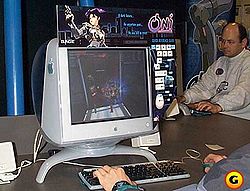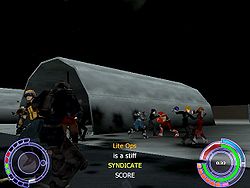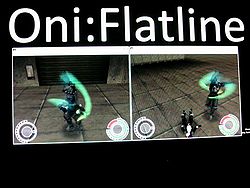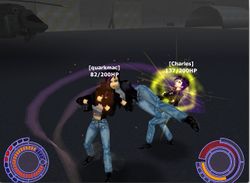Multiplayer: Difference between revisions
m (Mac OS X -> macOS) |
(giving the article an actual, decent lede) |
||
| Line 1: | Line 1: | ||
{{TOCfloat}} | {{TOCfloat}} During [[Oni|Oni's]] development, multiplayer gameplay was an expected feature among eager Bungie fans, especially since it was present in Bungie's previous titles [[Myth]] and [[Marathon]]. Although multiplayer was in fact a [[Pre-beta features|pre-beta feature]] of Oni, it was removed before release. Since then, there have been multiple attempts by fans to add this functionality into the game. | ||
{{Clearall}} | {{Clearall}} | ||
==Original multiplayer== | ==Original multiplayer== | ||
| Line 31: | Line 31: | ||
{{Clearall}} | {{Clearall}} | ||
==Fan-made multiplayer== | ==Fan-made multiplayer== | ||
There have been multiple efforts to add multiplayer back into Oni by | There have been multiple efforts to add multiplayer back into Oni by injecting code that synchronizes relevant elements of the game world between computers. | ||
[http://oniplayer.oni2.net/ OniPlayer] was a project coordinated by typhen and involving [[User:Admin|Alloc]], Kumo, neonew, and [[User_talk:Ssg|ssg]]. Up till the departure of typhen in 2005, the project remained in the memory-hacking phase, with limited applications of this knowledge being made by Alloc's [[ONI-Trainer|OniTrainer]], typhen's [[OniFly]], and neonew's [http://neonew.oni2.net/ OniHook], which could replicate character animation states | [http://oniplayer.oni2.net/ OniPlayer] was a project coordinated by typhen and involving [[User:Admin|Alloc]], Kumo, neonew, and [[User_talk:Ssg|ssg]]. Up till the departure of typhen in 2005, the project remained in the memory-hacking phase, with limited applications of this knowledge being made by Alloc's [[ONI-Trainer|OniTrainer]], typhen's [[OniFly]], and neonew's [http://neonew.oni2.net/ OniHook], which could replicate character animation states over a network. | ||
The next attempt at incorporating MP into Oni was the [[Flatline]] project, started in 2008, with its last release in 2011, and made possible by the [[Daodan DLL]]. Development progressed up to the point where Internet gameplay was smooth in low-latency conditions, though gunplay was not yet supported. [http://www.youtube.com/watch?v=GMeWr11QVjU This video] was made with the last Flatline build before development ceased. | The next attempt at incorporating MP into Oni was the [[Flatline]] project, started in 2008, with its last release in 2011, and made possible by the [[Daodan DLL]]. Development progressed up to the point where Internet gameplay was smooth in low-latency conditions, though gunplay was not yet supported. [http://www.youtube.com/watch?v=GMeWr11QVjU This video] was made with the last Flatline build before development ceased. | ||
Revision as of 19:57, 20 June 2017
During Oni's development, multiplayer gameplay was an expected feature among eager Bungie fans, especially since it was present in Bungie's previous titles Myth and Marathon. Although multiplayer was in fact a pre-beta feature of Oni, it was removed before release. Since then, there have been multiple attempts by fans to add this functionality into the game.
Original multiplayer
When Oni was first being shown publicly, multiplayer (MP) was promised, at least over LAN. Some words from the Oni staff on multiplayer (back when it was in development) can be found in interviews with Kevin Armstrong (networking programmer) and Steve Abeyta (3D animator), as well as with Brent Pease himself (see video link below). Eventually, in May of 2000, it was announced that there would be no multiplayer feature in Oni due to issues with latency (though the decision may have been made as early as December 1999).
The lack of multiplayer in the final product may have been the biggest blow to Oni's reception. Combined with complaints about the AI, players wanted to be able to play against other humans. The public viewed this as another sign of the game's incompletion, comparing Oni to FPS titles with multiplayer such as Unreal and Quake, and failing to recognize that melee combat over the Internet was nearly impossible at that time (and still is; Overgrowth a.k.a. Lugaru 2 promises LAN support only; a notable exception from Oni's time period seems to be State of Emergency, a melee-oriented game that apparently had reasonably fluid online multiplayer).
Some questioned why Bungie did not at least include LAN play functionality, since visitors to Bungie's booths were able to play LAN games (pictured at right, video below) at the E3 of May 1999 in Los Angeles, the New York City Macworld Expo of July 1999 and the San Francisco Macworld Expo of January 2000. However, multiplayer seems to have had latency issues even on LAN; Hardy LeBel stated, "The biggest factor in the decision to remove multiplayer support was the technological hurdle. We had been playing Oni over our office LAN and consistently experienced serious problems synching up the characters in multiplayer battles." Additionally, without more time to develop content for MP mode, the developers did not want to frustrate players with an incomplete netplay feature.
For a period of time, starting from the announcement that MP had been cut (on day 3 of E3, May 13, 2000), until some months after Oni's release, it was hoped that an update to Oni would add in multiplayer. However, as Bungie no longer owned the code, it would have fallen on Take-Two to perform this work. Whether due to the difficulty of learning and building on Bungie's code, or lack of financial motivation, no patches were made to Oni.
Video evidence:
- E3, May 1999 (2MB). GameSpot's brief coverage of Oni at E3 shows more MP gameplay; though brief, this is maybe the clearest footage. Are there 9 players in that game!?
- Macworld NY, July 1999 (3MB). In a one-minute interview, Project Lead Brent Pease talks about Oni, and some footage of attendees playing MP is shown.
- Macworld SF, Jan. 6, 2000 (9MB). In this excerpt from the Day 2 broadcast of BungieTV, Oni's animator, Steve Abeyta, works with one other player (Jim Ruiz?) to give us the longest look at MP.
- Macworld NY, July 20, 2000 (9MB). Though MP had been cancelled by this time, Oni Central's Harry shows an Oni video which seems to have been recorded using players running around in MP.
Firsthand fan accounts of MP. The first four are negative even about the promise of decent LAN performance, and the fifth post is more optimistic.
- http://carnage.bungie.org/oniforum/oni.forum.pl?read=12725
- http://carnage.bungie.org/oniforum/oni.forum.pl?read=12790
- http://carnage.bungie.org/oniforum/oni.forum.pl?read=10199
- http://carnage.bungie.org/oniforum/oni.forum.pl?read=10207
- http://carnage.bungie.org/oniforum/oni.forum.pl?read=3226
Fake multiplayer
Oni Team Arena was developed by geyser, after an "Unreal Tournament" attempt by Script10k, with help from Your_Mom and EdT. It used respawning AIs to emulate multiplayer-like gameplay and experiment with advanced modding, multiplayer-oriented or not (e.g., AI or collision upgrades). The mod was initially Windows-only, but once the Mac game application's BSL capabilities were brought up to par with Windows Oni, it was possible to make a fully featured version of OTA available for Macs too.
Apart from gameplay videos such as THIS one, a remarkable scene (heartwarming and disturbing at the same time... --geyser) is that of Russian kids playing Oni Team Arena and enjoying themselves tremendously.
Fan-made multiplayer
There have been multiple efforts to add multiplayer back into Oni by injecting code that synchronizes relevant elements of the game world between computers.
OniPlayer was a project coordinated by typhen and involving Alloc, Kumo, neonew, and ssg. Up till the departure of typhen in 2005, the project remained in the memory-hacking phase, with limited applications of this knowledge being made by Alloc's OniTrainer, typhen's OniFly, and neonew's OniHook, which could replicate character animation states over a network.
The next attempt at incorporating MP into Oni was the Flatline project, started in 2008, with its last release in 2011, and made possible by the Daodan DLL. Development progressed up to the point where Internet gameplay was smooth in low-latency conditions, though gunplay was not yet supported. This video was made with the last Flatline build before development ceased.
The most recent attempt at injecting MP into Oni is the Zukai project, begun in 2012, with its first release in 2015, though it is currently only available for macOS, with a Windows version to follow when gameplay is no longer in a rough alpha state.
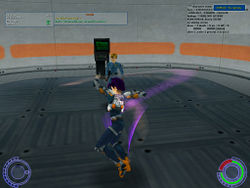 Around 2005, neonew figured out how to send animation data over a network. A movie is available here. |
